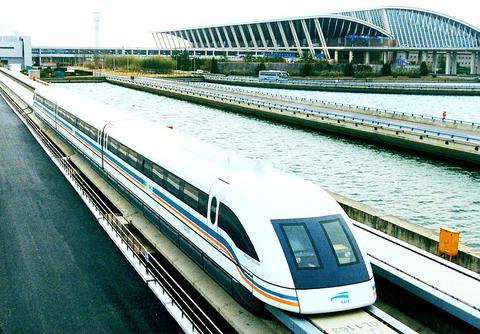A leading railway technology researcher on Friday said most Chinese experts do not favor the use of magnetic levitation technology, or maglev, for a planned high-speed link between Beijing and Shanghai.
"Most of the experts consider it is rational to stick to conventional railway technology [for the Beijing-Shanghai line]," Wang Derong (
A maglev line would be too expensive and too hard to integrate with conventional lines, said Wang, a retired railway engineer who has researched technology for the proposed Beijing-Shanghai line for the past 10 years.

PHOTO: AP
A conventional line would cost only about half as much as a maglev one, he said.
Wang's comments follow a China Daily report saying China has abandoned plans to build a high-speed magnetic-levitation railway between Beijing and Shanghai.
The reports say that China has decided to build less expensive conventional trains instead.
A maglev system can cost up to 300 to 400 million yuan (US$36 to US$48 million) per km, twice that of wheel-track lines, the paper said.
The paper, citing unidentified sources, said Premier Wen Jiabao (
The Railways Ministry had no immediate public comment on the matter. At least one newspaper, the Beijing Morning Post, said the decision to abandon the maglev plan had not been finalized.
The scrapping of the nine-year-old maglev notion -- two weeks after the country's first maglev, a short stretch in Shanghai, began regular operation -- represents a setback for the development of maglev technology in China, which many had seen as one of maglev's key markets.
It also appears to open the market for alternatives on the proposed Beijing-Shanghai line.
Other options for the railway, according to state media, include styling it after the Shinkansen, Japan's high-speed bullet train, or two methods used in France -- TGV and Inter-City Express. The Shanghai maglev is German-built.
German Chancellor Gerhard Schroeder said Friday he still believes there are chances for the German Transrapid consortium in China, despite the reports that China will not use the group's maglev technology for the Beijing-Shanghai line.
In comments aired on German, Schroeder said he believed "that the train which functions well ... will have its chances" in China.
China began daily runs of the world's first commercially operated maglev in Shanghai on Jan. 1, but the US$1.2 billion German-built system spans only 30 km. It connects Shanghai to its 3-year-old airport, the city's second.

Sweeping policy changes under US Secretary of Health and Human Services Robert F. Kennedy Jr are having a chilling effect on vaccine makers as anti-vaccine rhetoric has turned into concrete changes in inoculation schedules and recommendations, investors and executives said. The administration of US President Donald Trump has in the past year upended vaccine recommendations, with the country last month ending its longstanding guidance that all children receive inoculations against flu, hepatitis A and other diseases. The unprecedented changes have led to diminished vaccine usage, hurt the investment case for some biotechs, and created a drag that would likely dent revenues and

Global semiconductor stocks advanced yesterday, as comments by Nvidia Corp chief executive officer Jensen Huang (黃仁勳) at Davos, Switzerland, helped reinforce investor enthusiasm for artificial intelligence (AI). Samsung Electronics Co gained as much as 5 percent to an all-time high, helping drive South Korea’s benchmark KOSPI above 5,000 for the first time. That came after the Philadelphia Semiconductor Index rose more than 3 percent to a fresh record on Wednesday, with a boost from Nvidia. The gains came amid broad risk-on trade after US President Donald Trump withdrew his threat of tariffs on some European nations over backing for Greenland. Huang further

Macronix International Co (旺宏), the world’s biggest NOR flash memory supplier, yesterday said it would spend NT$22 billion (US$699.1 million) on capacity expansion this year to increase its production of mid-to-low-density memory chips as the world’s major memorychip suppliers are phasing out the market. The company said its planned capital expenditures are about 11 times higher than the NT$1.8 billion it spent on new facilities and equipment last year. A majority of this year’s outlay would be allocated to step up capacity of multi-level cell (MLC) NAND flash memory chips, which are used in embedded multimedia cards (eMMC), a managed

CULPRITS: Factors that affected the slip included falling global crude oil prices, wait-and-see consumer attitudes due to US tariffs and a different Lunar New Year holiday schedule Taiwan’s retail sales ended a nine-year growth streak last year, slipping 0.2 percent from a year earlier as uncertainty over US tariff policies affected demand for durable goods, data released on Friday by the Ministry of Economic Affairs showed. Last year’s retail sales totaled NT$4.84 trillion (US$153.27 billion), down about NT$9.5 billion, or 0.2 percent, from 2024. Despite the decline, the figure was still the second-highest annual sales total on record. Ministry statistics department deputy head Chen Yu-fang (陳玉芳) said sales of cars, motorcycles and related products, which accounted for 17.4 percent of total retail rales last year, fell NT$68.1 billion, or